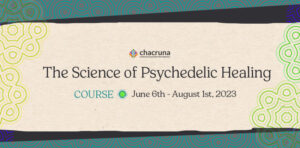- Breaking Convention Conference Lives Up to Its Psychedelic Reputation - May 31, 2023
- Creating Awareness on Sexual Abuse in Ayahuasca Communities: A Review of Chacruna’s Guidelines - February 8, 2022
- Iquitos, Capital of Ayahuasca, Struggles During COVID - October 19, 2020
Commencing on the 80th anniversary of the first intentional dose of LSD, Breaking Convention (BC), the United Kingdom’s biannual psychedelic conference returned in April (20th – 22nd) after a four-year break due to the pandemic for its 6th manifestation, this time in a new location, moving from the University of Greenwich to the beautiful campus grounds of the University of Exeter.
The brainchild of one of Kent university’s psychedelic science students at the time, Dave King, and a small group of pioneers in the field, Breaking Convention began in 2011 at the University of Kent to an audience of 500 delegates. It soon blossomed into one of the world’s biggest and best (IMHO) psychedelic science and culture conferences. Breaking Convention now attracts a huge international audience from over 40 countries including a large following of devotees who were thrilled to see the conference return this year in full force.
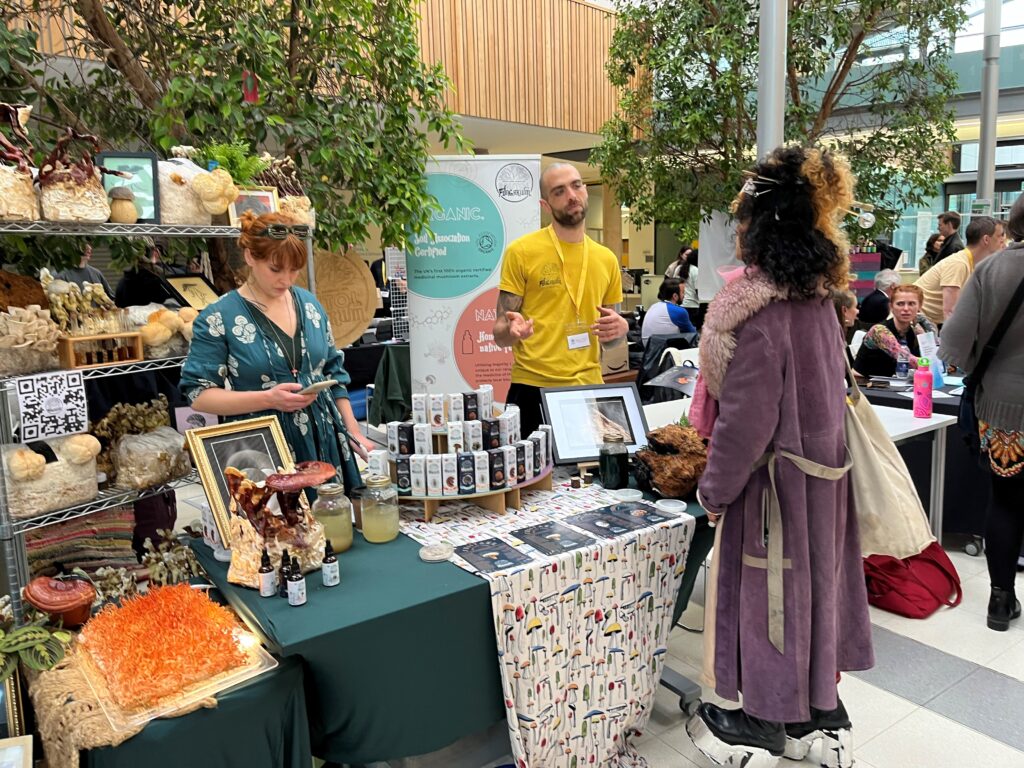
Festival Atmosphere
Newcomers, as well as vintage “BCers” or “Breakeros,” agree that this conference feels more like a festival than a conference, something that the UK does well, and just like a good festival, it’s the atmosphere, the people, the weird and wonderful conversations and synchronicities, that brilliant and completely unexpected breakthrough ‘performance’ you happened across—and of course, the drugs (well medicines), that make it!
In addition to three full days of academic presentations spanning four stages, Breaking Convention hosts a full cinema programme, which this year included glimpses into traditional plant medicine rituals, clinical treatments with psychedelics, personal journeys of self-discovery, and performative psycho-spiritual experiences using visual and musical media from healing rituals across the world; workshops across all days including psychedelic integration, cyberdelic experiences, magical plant inspired performances and a tea ceremony; plus a visionary art exhibition, as well as various impromptu visual and musical performances in the conference grounds throughout the weekend.
And then there’s the marketplace where you can easily while away hours shopping herbal remedies, including “vegan cocaine,” CBD oils, plant-based skincare, psilocybin products, and art, or learning about the work of various organisations in the field covering everything from drug education and awareness to tree planting projects in the Amazon, chatting with stall holders, or having a psychedelic experience through virtual reality… or otherwise, just go to the bar, always full throughout the weekend and sure to provide you with a new acquaintance and an interesting tale.
And if it all gets too much you can have a lie down in the “calm space” created to assist BCers experiencing “over stimulation,” a phrase I heard used a lot over the weekend.
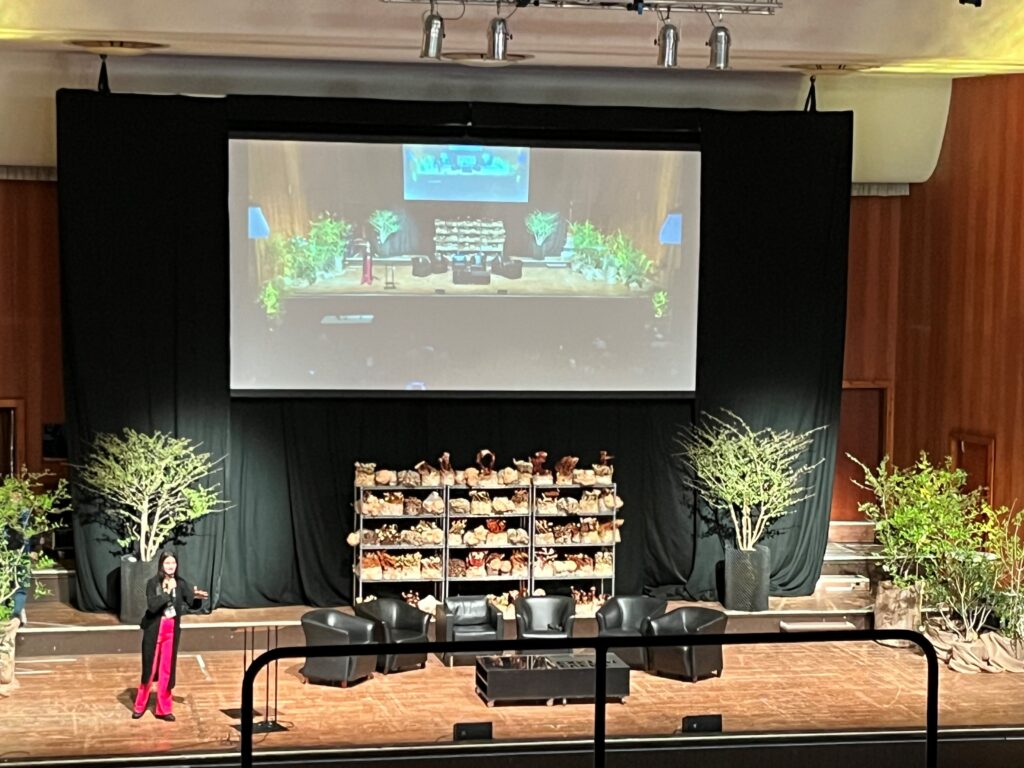
The Conference Headliners
It’s no surprise some attendees barely make any of the talks. Just like missing your favourite act at a festival, it’s easy to get distracted and waylaid at BC by a myriad of activity, gatherings, and strange happenings. But not to worry, as all talks are recorded and are made available online for all to access following the event.
This time the headliners were Graham Hancock, somewhat worryingly mobbed by attendees, who spoke on the quest for life after death through psychedelic experiences; Paul Stamets championing the benefits of psilocybin mushrooms on human behaviour with his over-riding suggestion (based on research) that they make better people and “can help save the world”; and Rick Doblin, a fan of BC himself who flew all night from doing a TED talk in Arizona to make it for his headliner spot on Saturday night , who charted and celebrated MAPS’ progress with MDMA trials, envisioning a world of “net-zero” trauma with the help of widespread psychedelic therapy by 2070. Hyperbolic and questionable claims perhaps, but representative of the optimism this conference fosters around psychedelic medicines, as well as the different approaches and perspectives it represents. Whereas Doblin’s focus is on legalization and medicalization of psychedelics, Stamets announced he was anti-legalization, but rather pro decriminalization. Debates around these different approaches rang out across conference talks and conversations among their audience throughout the weekend.
As these headliners also reflect, white males still dominate here as they do in the psychedelic science field, but the wider conference is representative of diversity across psychedelic communities and topics of focus show a desire to address issues of gender, race, and inclusivity, and engage with traditional cultures and knowledge, as well as psychedelic science and therapy. As well as talks from big name
“celebrities” in the psychedelic world, Breaking Convention welcomes speaker entries from all related fields, including practitioners, academics, social activists, commentators, and artists, priding its programme on being representative of the full breadth of contemporary psychedelic culture.
The academic programme this year brought attention to, among other things, racial inequality in the psychedelic field, abuses within psychedelic healing and therapy spaces, issues with regulation and safeguarding in psychedelic communities, the corporatisation of psychedelics, and even, recreational usage in psychedelic dance culture.
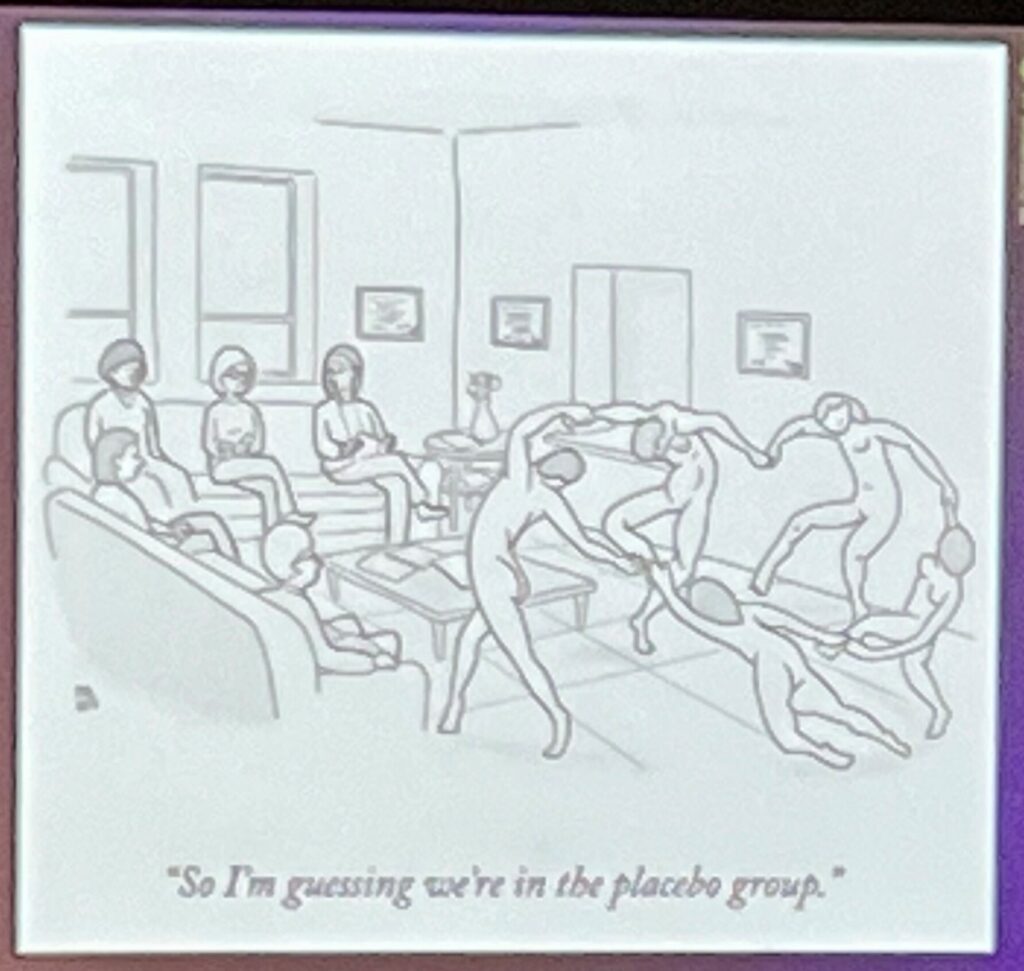
Debates Over Medicalization
One stand out session spanning half a day, proposed: “We need to talk about Ketamine.” This was the focus of much conversation among attendees, many of whom have experience of ketamine addiction within party and drug scenes, either personally or through people they know. Should ketamine really be at the forefront of efforts to legalize psychedelics and have them integrated into our medical systems when it is also a physically addictive substance with fatal casualties? While its utility in the treatment of alcohol addiction is proven, is the risk that some of these “recoveries” will result in further addiction to a potentially even more dangerous substance worth the possible benefits? Does growing ketamine usage point to a concerning drive for “disconnection” in society, rather than “connection,” which is surely what we should be aiming for through the expansion of psychedelic use? Another point that came through these talks and others was that criminalization, and increased criminalization, involving re-classification from Class C to B for instance (as in the case of ketamine), correlates with increasing public use of a substance.
Across the BC audience suspicions ran high around medicalization models while shifting focus on to de-criminalization seemed a more popular approach. Several speakers suggested that taking psychedelics in more informal or ritualistic communal settings is preferable to integrating them into our current Western medical models. Indeed, some feel psychedelic culture is better left underground, and its hijacking by the mainstream, especially corporate and medical industries, is of great detriment to integrity of practice.
Join us for our The Science of Psychedelic Healing course, June 6th – August 1st, 2023
Ongoing Safety Issues in the Psychedelic Community
Yet, as has come to light in recent years, there are a great many abuses taking place within psychedelic spaces—sexual, psychological, emotional, spiritual, as well as financial. It is no modern phenomenon that positions of power, such as that of healers or therapists, attract some people with negative motivations for personal gain and a propensity to want to abuse vulnerable people. The drive towards legalization can mean that we ignore these problems within our own community in an effort to present only the positive side of psychedelics to “outsiders.” While in the short-term this may seem preferable to some, in the long-term, we only create further problems for ourselves and a possible further backlash against psychedelic use once more. It was agreed widely that honesty around abuse and other negative potentialities in psychedelic spaces is key at this stage in the renaissance.
The issue of how to deal with bad actors was a key talking point at Breaking Convention. The need for monitoring bodies to address safeguarding issues in psychedelic therapy environments was expressed across different contexts covered throughout the conference. But, as posed in a panel addressing these issues, who would govern these ethical bodies? “Who would be the gatekeepers for the gatekeepers?” It was suggested that the creation of community led bodies to create guidelines and monitoring procedures for themselves is one viable route forward. Awareness raising on these issues rather than attempting to impose regulations might be the most realistic and fruitful course of action, at least for most settings in which psychedelic experiences take place.
Effects of Popularization and Professionalization
Another key talking point that spanned many talks at the conference was the worrying impact of social media on the psychedelic field, whereby inexperienced cyber “shaman” and opportunist psychedelic entrepreneurs have become influencers and industry leaders, selling their products and advice to vulnerable (usually young) people, many of whom are earnestly seeking answers and healing for physical and mental illness and trauma.
Indeed, what does it take to become an “expert” in this field?
A key issue we are facing is the exponential growth of psychedelic therapy over the past decade or so, stemming from centuries of traditional use of psychedelic plant medicines, a history which perhaps deserves greater acknowledgement from this young industry. The question of how to bring traditional knowledge to bare on clinical and other Westernized healing contexts is a big one. It begins at least with the recognition that we have much to learn from sacred medicine traditions and healers.
While curanderos have been working with sacred plant medicines in traditional settings for generations, the new age of psychedelic therapy is requiring that we train therapists in a matter of months to become guides in clinical settings. Related to this, another development that is of great concern is the recent proliferation of (very expensive) online facilitator training courses for healing retreats with psychedelic medicines.
Does this training really provide you with proficient experience to be working with patients and powerful psychedelic medicines? Can psychotherapeutic training ever prepare you for this kind of work? Should we even be attempting to do this therapy in clinical settings? How can an online course prepare someone to assist a person through a spiritual crisis during the throes of a psychedelic ceremony? Furthermore, if qualifications are to be required to do this work, what becomes of the many more experienced facilitators and guides already working for many years in these spaces without official status? These are some of the questions which arise through debates around these issues.
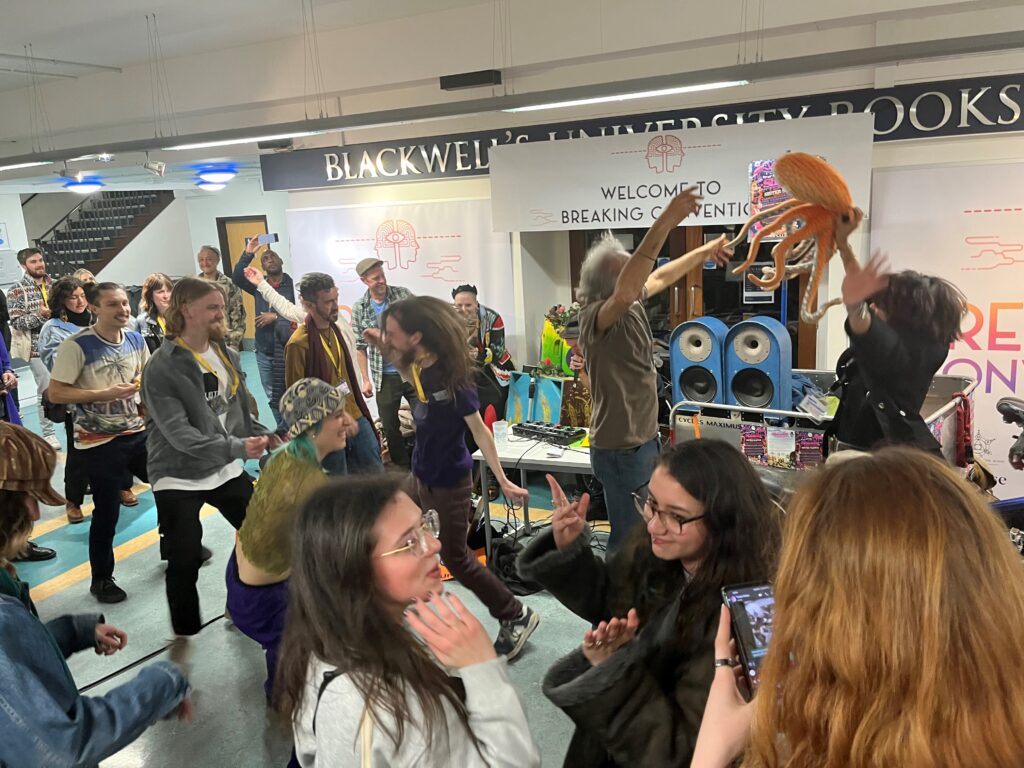
What arose from this conference throughout and across the sessions is the great tension that exists between traditional and underground usage of psychedelic substances and the mainstreaming of psychedelics involving formalization, legalization, medicalization, and corporatization. As we move inevitably into this “new age” of psychedelic therapy and industry, is it possible to maintain the authenticity and love that we experience through the ritual and indeed, also recreational use, of these magical plants and substances?
As we move inevitably into this “new age” of psychedelic therapy and industry, is it possible to maintain the authenticity and love that we experience through the ritual and indeed, also recreational use, of these magical plants and substances?
On that note, followed by a beautiful closing ceremony which brought everyone together in reverence for their shared and personal experiences of the conference (not something you’d find at most academic conferences), Breaking Convention’s after party, as always, was a highlight, a communal celebration in which to dance, share ideas and reflections, and generally have a good time. As always, Breaking Convention held the space for its attendees to do just that!
Art by Mariom Luna.
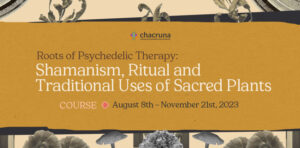
Join us for our Roots of Psychedelic Therapy: Shamanism, Ritual and Traditional Used of Sacred Plants course, August 8th – November 21st, 2023
Take a minute to browse our stock:
Did you enjoy reading this article?
Please support Chacruna's work by donating to us. We are an independent organization and we offer free education and advocacy for psychedelic plant medicines. We are a team of dedicated volunteers!
Can you help Chacruna advance cultural understanding around these substances?











